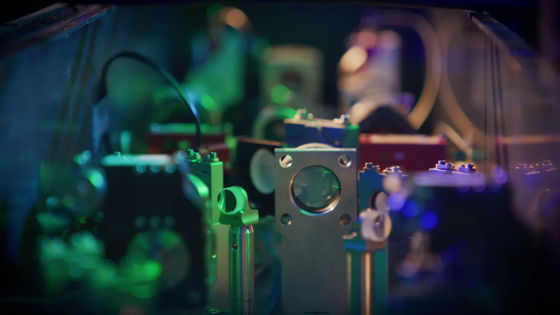Microsoft and Atom Computing announce they will launch a commercial quantum computer as early as 2025

At
Microsoft announces the best performing logical qubits on record and will provide priority access to reliable quantum hardware in Azure Quantum - The Official Microsoft Blog
https://blogs.microsoft.com/blog/2024/09/10/microsoft-announces-the-best-performing-logical-qubits-on-record-and-will-provide-priority-access-to-reliable-quantum-hardware-in-azure-quantum/

Demonstrating high-fidelity gates and the world's largest entangled logical qubit state in Atom Computing's flagship systems - Atom Computing
https://atom-computing.com/high-fidelity-gates-and-the-worlds-largest-entangled-logical-qubit-state/

Microsoft and Atom Computing will launch a commercial quantum computer in 2025 | TechCrunch
https://techcrunch.com/2024/11/19/microsoft-and-atom-computing-will-launch-a-commercial-quantum-computer-in-2025/
Microsoft and Atom Computing combine for quantum error correction demo - Ars Technica
https://arstechnica.com/science/2024/11/how-to-fix-quantum-computing-errors-neutral-atom-edition/
Quantum computers hit a crucial milestone for error-free calculation | New Scientist
https://www.newscientist.com/article/2456985-quantum-computers-hit-a-crucial-milestone-for-error-free-calculation/
Microsoft and Atom Computing unveil 24-qubit quantum machine - Nextgov/FCW
https://www.nextgov.com/emerging-tech/2024/11/microsoft-and-atom-computing-unveil-24-qubit-quantum-machine/401140/
Microsoft and Atom Computing leap ahead on quantum frontier
https://www.geekwire.com/2024/microsoft-atom-computing-quantum-logical-qubits/
Microsoft and Atom Computing set to launch commercial quantum computer next year
https://betanews.com/2024/11/19/microsoft-and-atom-computing-set-to-launch-commercial-quantum-computer-next-year/
Microsoft and Atom Computing claim breakthrough in reliable quantum computing | Network World
https://www.networkworld.com/article/3608603/microsoft-and-atom-computing-claim-breakthrough-in-reliable-quantum-computing.html
Microsoft and Atom Computing have succeeded in ' quantum entanglement of 24 logical qubits using laser-pinned neutral atoms,' a breakthrough in fault-tolerant quantum computing.
According to Microsoft and Atom Computing, this is the first time that 24 logical qubits have been entangled, and they have also successfully detected and repeatedly corrected the loss of one of the neutral atoms that make up the physical qubit.
Microsoft and Atom Computing plan to offer quantum computers based on this technology to commercial customers as early as 2025. The quantum computer is expected to contain more than 1,000 physical qubits.

Using this system, Microsoft and Atom Computing successfully created 20 logical qubits from 80 physical qubits and performed the Bernstein-Vazirani algorithm . The Bernstein-Vazirani algorithm is a classical quantum algorithm designed in the 1990s that essentially demonstrates the effects of superposition (the ability of a qubit to be both 0 and 1 simultaneously) and interference (the application of a counter effect whereby different parts of the superposition interfere with each other to produce a useful result). While a classical computer would need to try every possible combination, a quantum computer can test all combinations at once, allowing it to be performed with just a single query.
'We've demonstrated that by running this hardware and the Bernstein-Vazirani algorithm on 20 logical qubits, we can achieve better than physical performance,' said Christa Svoa, technical fellow and vice president of advanced quantum development at Microsoft Azure Quantum. 'We've found that this algorithm achieves better performance than conventional ones. We've demonstrated the ability to compute with these logical qubits and also demonstrate that iterative loss compensation can be performed with these qubits.'
Microsoft reported that it had succeeded in creating 12 logical qubits in September 2024, but this technology, combined with advances in Atom Computing's neutral atom-based systems, has brought commercial quantum computers closer to reality, Svoa said.
Microsoft announces creation of 12 logical qubits, bringing quantum computing closer to practical use - GIGAZINE

One of the challenges of working with neutral atoms is that they sometimes disappear. This is in addition to the noise problem that all quantum computers must overcome. The challenge is realizing when an atom has disappeared. Microsoft monitors the decay of the neutral atoms by taking an image immediately after loading them into the system to ensure that all atoms are aligned. The system also detects light emission to confirm that the atoms are in the correct position.
'We wanted to be able to detect when an atom was lost and compensate for the loss without stopping the computation. That's the key element we bring to the qubit virtualization system. We designed the virtualization system taking into account the loss mechanisms that appear in this type of hardware. The qubit virtualization system can counter the loss by detecting and compensating for the loss of atoms,' said Svoa. This is also the first time that neutral atom loss correction has been demonstrated, according to Svoa.
'We are pleased to continue our collaboration with Microsoft as they achieve important milestones in quantum computing,' said Ben Bloom, founder and CEO of Atom Computing. 'By combining our cutting-edge neutral atom qubits with Microsoft's qubit virtualization system, we can now deliver reliable logical qubits on commercial quantum machines. This system will enable rapid advancements in multiple fields, including chemistry and materials science.'
Related Posts:






